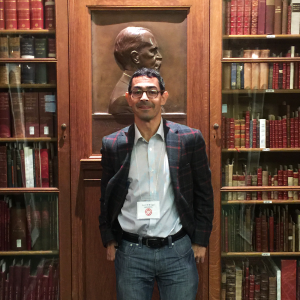Takeaway
In medicine, uncertainty abounds. Poker can teach us how to make smarter decisions when we don’t have all the facts.

Lifelong learning in clinical excellence | March 17, 2020 | 3 min read
By Scott Wright, MD, Johns Hopkins Medicine
I’m not much of a gambler or poker player, but sometimes I’ll watch poker on TV while working out. I recently read professional poker player Annie Duke’s “Thinking in Bets: Making Smarter Decisions When You Don’t Have All The Facts,” in which she extrapolates the lessons she’s learned from playing poker to the choices we make in our lives. The author contends that there are ways to make “smarter decisions” when we don’t have all the facts (like when two cards that may contribute to a hand are face down).
The teachings in this book can be incredibly useful for healthcare professionals. In medicine, there’s usually uncertainty (if not ambiguity) as we work with our patients to decide upon the most reasonable and appropriate course of action.
Here are a few insights that were related to healthcare that were most interesting to me:
1. Medicine is a lot more like poker than it is chess. (Life is also like poker!)
Chess has no hidden information and there’s almost no luck. By contrast, poker is a game of decision-making under conditions of uncertainty. Lots of valuable information is hidden and there is definitely an element of luck, risk, and sometimes even deception.
Explicitly explaining to patients that there’s uncertainty and that we’re making the best guess based on what we know is necessary. I also tell my patients that new details will likely emerge (perhaps in one hour or in one month) that might cause us to rethink the decisions we’re making now.
2. Hindsight bias is common.
In both poker and medicine, we tend to think that our decisions were sound when the results are favorable, and that our decisions were poor when things don’t turn out well; this is also referred to as “resulting.”
If a physician prescribes an antibiotic inappropriately (one that is not indicated and represents overuse because of the potential harm), this wasn’t a good choice even if the patient is feeling better in a week.
The medical decisions that we make are merely bets on the future. These decisions are not “wrong” or “right” based on whether the patient ends up doing well or not. We need to remind ourselves that luck (good or bad) will influence how things turn out.
3. Make peace with saying, “I don’t know,” and, “I’m not sure.”
Saying this affirms that our thinking is a “work in progress” and may encourage us to more fully consider the matter and to dig deeper—this can help us to arrive at an objective truth sooner.
When I was a medical student, several of my teaching attendings urged me to write “NYD” next to a problem that was of uncertain etiology; this stood for “not yet diagnosed” or “not yet determined.” To this day, in my “Assessment and Plans” at the end of my notes I still routinely write: “Ascites NYD,” or, “Cough NYD.” Like most of us, I prefer answers to uncertainty, and the act of writing NYD motivates me to reflect upon the patient and consider whether there are reasonable actions that we (the patient and me) can take to advance our understanding.
4. When few things are certain, most things are merely a bet.
Instead of asking yourself, “am I confident or not?” it’s better to ask yourself, “how confident am I?” in a specific patient care decision.
For example, despite the evidence from studies conducted on large populations that treating patients with modest hypertension is beneficial, it may be difficult to know how to proceed with Ms. Y who is a 62-year-old English teacher with consistent blood pressure readings of 140/87 even after lifestyle modifications. If through shared decision-making the patient and clinician decide to initiate treatment (even though Ms. Y deplores the idea of taking medication), we’re betting that the benefits will outweigh the risks and we must revisit the decision when more data becomes available (e.g. response to therapy and side effects she experiences).
Annie Duke’s book offers tips to help us make smarter decisions and reminds us that we usually don’t have all the facts so that we should be “thinking in bets.” In doing so, we can wisely recalibrate these bets when new data presents itself.

